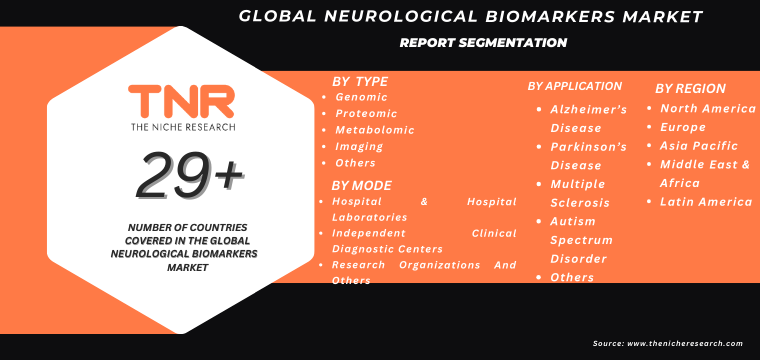The global neurological biomarkers market stands at the forefront of transformative advancements, revolutionizing the diagnosis, treatment, and management of neurological disorders. Biomarkers, as invaluable indicators of physiological states or disease progression, play a pivotal role in elucidating the intricate complexities of neurological conditions. This burgeoning market not only holds the promise of early disease detection but also fosters personalized treatment strategies, driving innovation and precision medicine in the realm of neurology. As research continues to unveil novel biomarkers, propelling advancements in technology and data analytics, the landscape of neurological care is poised for remarkable evolution, offering immense potential for improved patient outcomes and enhanced quality of life.
Biomarkers have gradually been introduced into clinical practise and clinical trials in the field of neurology in recent decades. Because of technical improvements that have boosted the precision and sensitivity of equipment and tests, as well as cross-fertilization from one field of neurology to another, the rate of discovery has accelerated. The arsenal of biomarkers in neurology is anticipated to expand as our capacity to properly quantify many biological variables and our understanding of the pathophysiology of neurological illnesses improves.

Future Global Neurological Biomarkers Market
The future of the global neurological biomarkers market appears promising and dynamic, characterized by a convergence of cutting-edge technologies, extensive research endeavors, and a burgeoning understanding of neurological diseases. Advancements in technologies like genomics, proteomics, metabolomics, and imaging techniques are expected to expand the repertoire of biomarkers available for neurological conditions. This expansion will likely lead to more accurate diagnostic tools, enabling earlier disease detection and intervention. Additionally, the development of non-invasive or minimally invasive biomarker detection methods could revolutionize patient care, improving monitoring and treatment response assessment.
In the application segment, Alzheimer’s disease, a progressive neurodegenerative disorder, has been a focal point in neurological biomarker research due to its prevalence and significant impact on patients’ lives. Recently the Alzheimer’s Drug Discovery Foundation has invested in a Canadian neuroimaging firm to speed the development of new biomarkers for Alzheimer’s disease and associated dementias. Thus in the upcoming years, ongoing research aims to discover and validate additional biomarkers to improve diagnostic accuracy.
Overview of Competitive Landscape Global Neurological Biomarkers Market
The Niche Research provides in-depth analysis of the global neurological biomarkers market and the recent collaborations, strategic partnerships, mergers, and acquisitions aimed at advancing research, improving diagnostic capabilities, and bringing novel biomarkers closer to clinical applications for better patient care.
Global Neurological Biomarkers Market Players
- Abbott
- BIOMERIEUX
- Bio-Rad Laboratories, Inc.
- Johnson & Johnson Services, Inc.
- Merck KGaA
- Quanterix
- Rules-Based Medicine
- Thermo Fisher Scientific Inc.
- Other Market Participants
Global Neurological Biomarkers Market
By Type
- Genomic
- Proteomic
- Metabolomic
- Imaging
- Others
By Application
- Alzheimer’s Disease
- Parkinson’s Disease
- Multiple Sclerosis
- Autism Spectrum Disorder
- Others
By End Use
- Hospital & Hospital Laboratories
- Independent Clinical Diagnostic Centers
- Research Organizations And Others
By Region
- North America (U.S., Canada, Mexico, Rest of North America)
- Europe (France, The UK, Spain, Germany, Italy, Nordic Countries (Denmark, Finland, Iceland, Sweden, Norway), Benelux Union (Belgium, The Netherlands, Luxembourg), Rest of Europe)
- Asia Pacific (China, Japan, India, New Zealand, Australia, South Korea, Southeast Asia (Indonesia, Thailand, Malaysia, Singapore, Rest of Southeast Asia), Rest of Asia Pacific)
- Middle East & Africa (Saudi Arabia, UAE, Egypt, Kuwait, South Africa, Rest of Middle East & Africa)
- Latin America (Brazil, Argentina, Rest of Latin America)

Can you be more specific about the content of your article? After reading it, I still have some doubts. Hope you can help me.